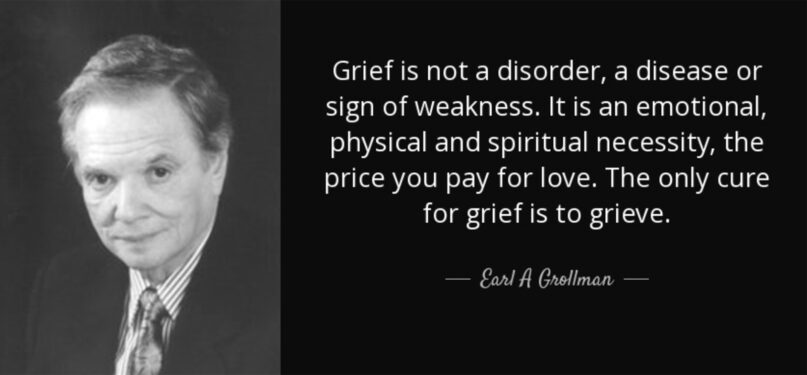(RNS) — Go into any rabbi’s study — at least, rabbis of a certain generation — and you will find them.
There will be an entire half shelf devoted to books about death and grieving, and how to cope with death, and how to speak to children about death. Those books have been the go-to resources for rabbis and other clergy who were seeking ways to help their congregants, and themselves, create a spiritual GPS through “the valley of the shadow of death.”
Among the titles: “Living When A Loved One Has Died”; “Living With Loss, Healing With Hope”; “A Complete Book About Death for Kids”; “When Someone You Love Has Alzheimer’s”; “What Helped Me When My Loved One Died.”
Their author was Rabbi Earl Grollman, who died recently at the age of 96. Rabbi Grollman was the longtime rabbi of Beth El Temple Center in Belmont, Massachusetts. His pulpit was not only physical; it was literary, hailed by such national figures as Fred Rogers.
And he wrote not only on death; Rabbi Grollman addressed divorce and other previously taboo topics.
When we ask the question “What single book, written by a rabbi, had the largest pastoral impact in our time?,” the answer would be clear: “When Bad Things Happen to Good People,” by Rabbi Harold Kushner.
But, in terms of sheer output, no other American rabbi made such a sustained contribution to pastoral care as Rabbi Grollman. In total, he authored or edited almost 30 books and countless articles.
I have been musing about a small geographical fact — that the three rabbis whose literary works have been most helpful, in a pastoral sense, were all rabbis from the greater Boston area. (Cue “Sweet Caroline.”)
Yes, Rabbi Earl Grollman of Belmont, and Rabbi Harold Kushner of Natick, and a man whose singular contribution might have slipped behind the bookcase of memory, but whose life is still a beacon.
Go back in time, 75 years. Ask your great-grandparents to name three famous Reform rabbis. They would have said: Rabbi Stephen S. Wise and Rabbi Abba Hillel Silver — both of them renowned for their activism and their influence on the Zionist movement.
They might also have offered another name: Rabbi Joshua Loth Liebman.
If you are scratching your heads and asking: “Who?” — let me tell you about him.
Rabbi Joshua Loth Liebman had served as the rabbi of KAM Temple in Chicago — now, KAM-Isaiah Israel. He then became the rabbi of Temple Israel in Boston.
In 1946, Rabbi Liebman authored “Peace of Mind.” It was a book about how to achieve inner serenity. It was arguably the first of a literary cottage industry: self-help books.
This year quietly marked the 75th anniversary of “Peace of Mind.” In fact, Oct. 27 will mark the 75th anniversary of that book’s ascent to No. 1 on the New York Times Best Sellers list.
This was not just the first (and only) time a rabbi wrote a No. 1 book (though “When Bad Things Happen to Good People” was a longtime bestseller); it was also the first time a book by a clergy person achieved such a status.
Not to be outdone, two years later Bishop Fulton B. Sheen came out with a book. The bestseller “The Power of Positive Thinking” by Norman Vincent Peale came several years later, in 1952.
Rabbi Liebman’s book was noteworthy in yet another way. It was the first book to integrate religious thinking with psychoanalysis, which had become increasingly popular in postwar America.
Rabbi Liebman died while his book was still a bestseller, in 1948, at the age of 41. He died far too young, and undoubtedly, with many more books within him.
I free associate from Rabbi Grollman, to Rabbi Kushner, to Rabbi Liebman — not only to show the Boston connection, which might be coincidental — but to make a larger, sociological point.
First, the congregations that Rabbis Grollman, Kushner and Liebman served were proud of their rabbis’ books. They believed the spreading of wisdom was a rabbinical task that would take their rabbis’ words way beyond their local sanctuaries.
And, second: Because they could take their words beyond their local sanctuaries, those three rabbis had immense influence on how Americans thought about the most private and sensitive of matters. In that sense, their Torah was universal. For those struggling with deep, personal issues, those three rabbis were the most influential rabbis — no, perhaps even clergy — in America.
Let me add: That collective achievement happened when books required paper and cloth bindings, and when there were only a few radio or television stations.
Today?
Let me not only say that Rabbi Earl Grollman’s books, ironically and sweetly, had already prepared his survivors to process his ultimate death. Let me also say: We need more voices like his. The world is not only ready; the world is open.
May Rabbi Grollman’s memory be a blessing.






